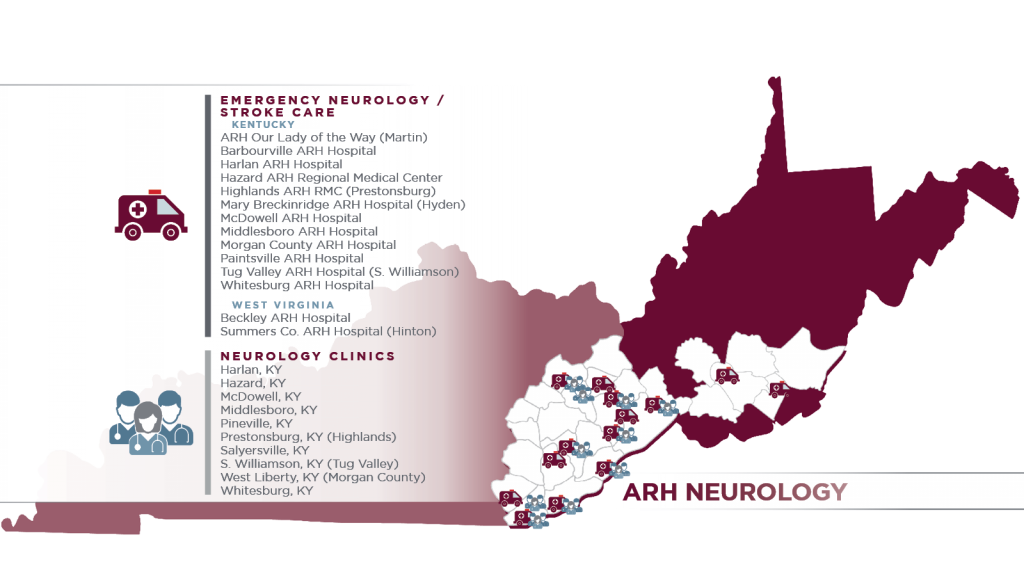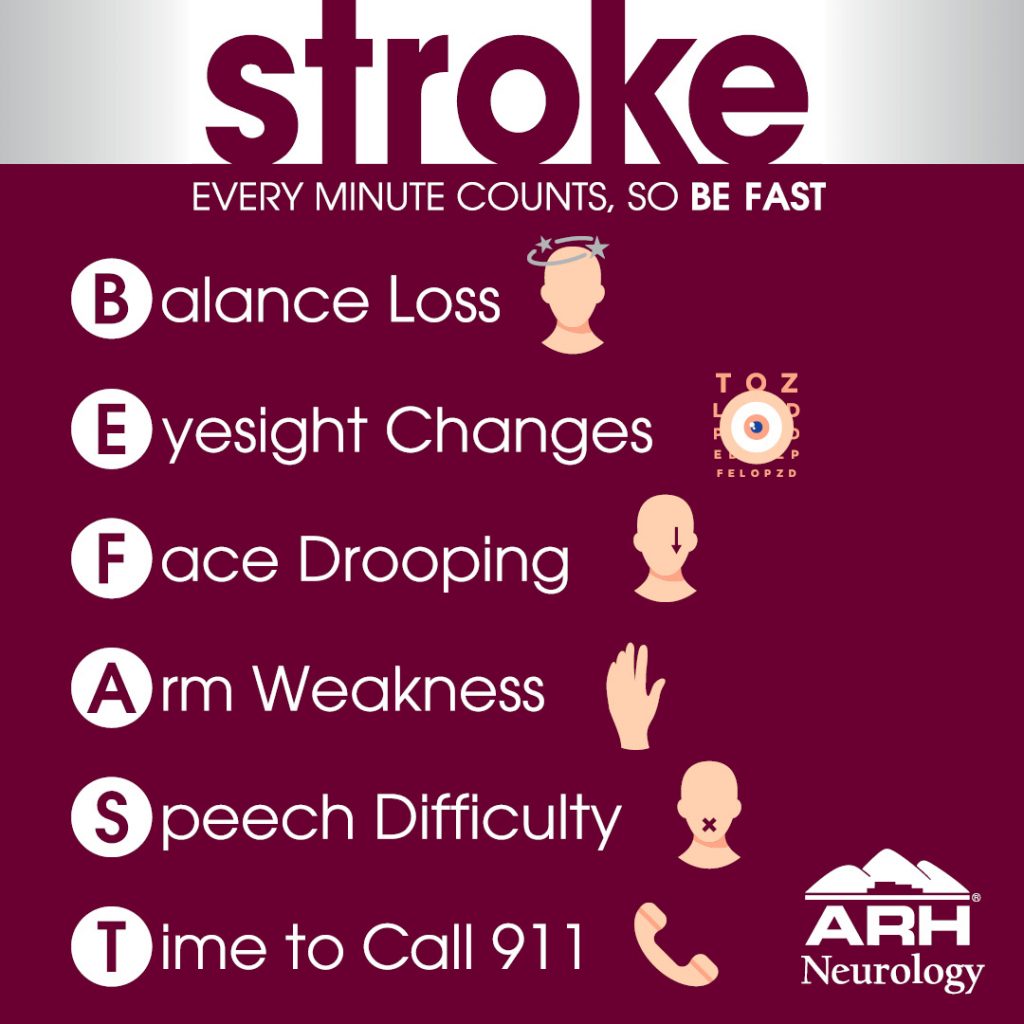NEUROLOGY
NEuROLOGY
Appalachian Regional Healthcare (ARH) Neurology, where every heartbeat matters and every mind finds solace. Our dedicated team of world-class Neurologists will guide you with warmth, expertise and compassion. They are committed to being with you and will guide you every step of your journey of healing. Trust in our dedicated team of specialist who are not just to treat, but to understand, support and empower you on your path of Neurological wellness. Your comfort, health and happiness are our top priorities at ARH

SERVICES & THE ARH COMPREHENSIVE SYSTEM OF CARE
- Clinic Visits / Outpatient Care
- Emergency Care Testing, Diagnosis and Treatment
- Home Health offers restorative therapy services including physical therapy (PT) and occupational therapy (OT) plus a home education program for medications, home assessment for falls risk, assess home for home adaptive equipment such as shower chair, bed side commode, and more. CLICK TO LEARN MORE
- HomeCare Stores/Home Medical Equipment provides the necessary adaptive equipment. These items can be direct shipped or delivered to your home. Swing bed or certified skilled nursing is a level of care that provides patients with skilled nursing services or skilled rehabilitation services. Both levels of care are performed under the supervision of a physician, a registered nurse, a licensed physical and occupational or speech therapist. Daily skilled services are provided on an inpatient basis.
- In-Patient Care and Consultation
- Medical Guidance and Educaiton
- Rehabilitation - physical, speech and occupational therapies
- Swing Bed or Certified Skilled Nursing is a level of care that provides patients with skilled nursing services or skilled rehabilitation services. Both levels of care are performed under the supervision of a physician, a registered nurse, a licensed physical and occupational or speech therapist. Daily skilled services are provided on an inpatient basis.. CLICK TO LEARN MORE
- Swing Bed or Certified Skilled Nursing physical, speech and occupational therapies
WHAT WE TREAT
- Alzheimer’s/ Dementia
- Amyotrophic Lateral Sclerosis (ALS)
- Back Pain
- Bell’s Palsy
- Brain Injury
- Carpal Tunnel Syndrome
- Cerebral Palsy
- Cognitive Disorders/ Altered Mental Status/ Confusio
- Concussion/ Head Injury
- Dizziness
- Epilepsy/ Seizure Disorder
- Guillain-Barré Syndrome
- Multiple Sclerosis
- Neuromuscular Diseases
- Migraines/ Headaches
- Movement Disorders/ Parkinson’s Disease/ Tremors
- Myelopathy
- Seizures
- Sleep Disorders
- Spinal Cord Injury
- Stroke/TIA
- Vertigo/Gait and Balance Issues
EMERGENCY NEUROLOGY
All ARH hospitals are capable of administering IV thrombolytics for stroke and our administration times are among the fastest in the state and consistently faster than the national average.
BENEFITS
- 24/7/365 availability for admitted and observation patients.
- Faster treatment improves recovery and reduces stroke-related disability.
- Reduced the need for travel to a more distant hospital.
- Expertise of a neurologist at hospitals where that service is not available.
- In-patient care and consultation for any neurologic condition.
- More thorough triage of patients exhibiting acute stroke symptoms.
- Allows patients to receive treatment and stay in their community .
TELESTROKE
Many hospitals don’t have neurologists on call. Now anyone exhibiting neurologic symptoms in one of the 14 ARH hospitals can receive quality neurology care. With ARH Telestroke, neurologists at one location examine and talk to patients in another location and in real time using hi-tech equipment. The neurologist collaborates with on-site doctors to provide diagnosis, treatment, and specialty care. Working together for you ARH TeleStroke is comprised of team that includes neurologists, emergency medicine and hospital doctors, radiology technicians, informational technology staff, nurses, nurse practitioners and other staff.
The ARH emergency teleneurology service covers all neurological emergencies occurring in any location in the hospital, including acute stroke. While stroke/telestroke may be the most familiar reason for emergency consult, our neurologists are deeply experienced in handling all varieties of neurologic issues.


OUTPATIENT CLINICS
The ARH neurology team provides comprehensive follow up care to patients seen in the hospital as well as scheduling new patients. Our doctors collaborate with you and your family to design treatment plans customized to your needs.
BENEFITS
- You get the right care at the right time and in the right place.
- Improved access to neurology care.
- Reduced waiting time.
- Reduced travel time and costs.
- Reduced absence from work.
- Care close to home.
In Person Clinics – ARH has several local clinics within person neurologists.
Connected Care Anywhere (Virtual Visits) – In all ARH communities, patients can have a neurology appointment using their webcam enabled mobile device or computer from the convenience of home, work, or other location.
Connected Care Clinics (Telemedicine) – Select ARH clinics connect you to a neurological specialist to reduce or eliminate travel, saving you time and money. Patients come to an ARH telemedicine connected clinic to see a neurologist through a live monitor. Our Neurologists see and hear the same things they would during in-person visits, using specialized telemedicine equipment.
- The appointment takes place in a private clinic room.
- A clinician or clinical assistant may stay with you depending the needs of the appointment.
- Someone will assist you as needed at any time during your visit.
- Reduced travel time and costs.
- Reduced absence from work.
- Care close to home.
ARH MEMORY CARE
Compassion, Dignity, and Support in Every Moment
ARH Memory Care provides services for Medicare recipients with Alzheimer’s disease or dementia, improving quality of life and supporting their caregivers.
- 24/7 Support
- Dedicated Care Team with Nurse Navigator and Personalized Plan of Care
- Caregiver Education and Support Including Respite Services
- Care Coordination That Includes Referrals for Healthcare and Social Needs
For more information or to make a referral:
ARH Memory Care Navigator
Phone: 606.477.0303 call or text 606.889.6343
Fax: 606.889.6161
memorycare@arh.org

NEUROLOGY IMAGING / TESTING
ARH now uses Viz.ai artificial intelligence to analyze medical imaging, particularly for stroke detection and treatment. This helps providers identify and prioritize stroke cases, leading to faster diagnosis and treatment of patients.
Neurologists may recommend a variety of procedures to help diagnose or treat your condition, including. These procedures may include:
- Lumbar Puncture
- Tension Test
- Electroencephalography (EEG) is a technique used to track the electrical activity of the brain through the placement of electrodes on the scalp. EEGs are often used to identify seizures.
- Electromyography (EMG) is a technique that allows for the recording of the electrical impulses that are generated by muscle activity that is often used to diagnose nerve and muscle disorders.


